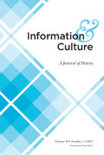
Information & Culture
Scope & Guideline
Bridging Cultures Through Information Science
Introduction
Aims and Scopes
- Interdisciplinary Research on Information Practices:
The journal emphasizes research that intersects various disciplines, including cultural studies, information science, media studies, and technology studies, facilitating a comprehensive understanding of information dynamics. - Cultural Implications of Technological Advances:
A core focus is on how technological advancements, particularly in digital media and AI, influence cultural practices, identity, and social structures. - Critical Examination of Power and Ethics:
The journal publishes works that critically analyze the power dynamics and ethical considerations surrounding information access, privacy, and intellectual freedom. - Historical Perspectives on Information:
It includes research that contextualizes contemporary issues within historical frameworks, examining how past practices inform current information cultures. - Activism and Information Justice:
The journal supports discussions on information activism, advocating for equitable access to information and addressing issues of representation and social justice in information practices.
Trending and Emerging
- Artificial Intelligence and Society:
A significant trend is the exploration of artificial intelligence's societal impact, focusing on ethical considerations, biases, and the role of AI in shaping cultural narratives. This theme is increasingly relevant as AI technologies become ubiquitous. - Digital Activism and Social Justice:
There is a growing emphasis on digital activism, particularly how marginalized communities use information technologies to advocate for social justice and political change. This focus reflects a broader societal movement towards equity and representation. - Privacy and Surveillance in the Digital Age:
Recent papers have increasingly addressed issues of privacy, data protection, and surveillance, examining how these factors affect individuals and communities in a digital landscape that often prioritizes security over personal freedoms. - Cultural Studies of Digital Media:
The journal is witnessing a surge in research that critically analyzes digital media's role in shaping cultural identities and practices, particularly in the context of streaming culture and social media. - Intersections of Gender, Race, and Technology:
Emerging themes include the intersections of gender, race, and technology, highlighting how these identities influence and are influenced by information practices and digital cultures.
Declining or Waning
- Traditional Library Science Topics:
There has been a noticeable decline in papers focusing solely on traditional library science topics, such as cataloging and classification, which were once prevalent. The shift towards broader cultural and technological issues indicates a move away from these foundational themes. - Historical Accounts of Print Media:
Research centered on the historical significance of print media, such as books and newspapers, has become less frequent. The journal's current trajectory favors digital media and its implications over traditional print histories. - Narrowly Defined Information Technologies:
Papers that focus exclusively on specific information technologies without considering their broader cultural implications are becoming less common. The trend is shifting towards interdisciplinary approaches that integrate technology with cultural analysis.
Similar Journals
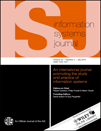
INFORMATION SYSTEMS JOURNAL
Showcasing Premier Research in Information Systems and CommunicationsINFORMATION SYSTEMS JOURNAL, published by Wiley, is a prestigious academic journal dedicated to advancing the field of information systems, encompassing key areas such as computer networks, communication technologies, and software engineering. With an impressive track record of more than three decades, since its inception in 1991, the journal has secured a prominent position reflected in its Q1 rankings across multiple categories in 2023, placing it among the top-tier journals in Computer Networks and Communications, Information Systems, and Software. It boasts outstanding Scopus ranks, with percentiles in the 90s, positioning it as a vital source of cutting-edge research for professionals, academics, and students aiming to enhance their knowledge and contribute to the evolving landscape of information technology. Although it does not currently offer open access, the journal welcomes contributions that bridge theoretical insights with practical applications, fostering a dialogue among researchers and practitioners in the fast-paced world of information systems.
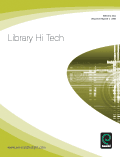
LIBRARY HI TECH
Advancing Knowledge in Library and Information SciencesLIBRARY HI TECH is a distinguished peer-reviewed journal published by Emerald Group Publishing Ltd, offering a vital platform for researchers, professionals, and students in the fields of Library and Information Sciences and Information Systems. Since its inception in 1983, this journal has been instrumental in disseminating cutting-edge research and innovative practices, boasting an impressive Q1 ranking in Library and Information Sciences and a Q2 ranking in Information Systems as of 2023. Recognized globally for its robust scholarship, LIBRARY HI TECH holds significant positions in Scopus, ranking #22 out of 280 in Library and Information Sciences, placing it in the top 92nd percentile, and ranking #77 out of 394 in Computer Science — Information Systems, with an admirable 80th percentile. This journal not only enriches the academic dialogue but also contributes to the practical evolution of library technologies and information management, making it an essential resource for those keen on advancing their knowledge in these dynamic fields. With no open access, access is typically gained through institutional subscriptions or direct purchase, ensuring high-quality dissemination of research findings.

Connectist-Istanbul University Journal of Communication Sciences
Empowering Research with Open Access KnowledgeConnectist-Istanbul University Journal of Communication Sciences is a distinguished academic publication under the auspices of Istanbul University, Faculty of Communication, dedicated to advancing the field of communication studies. Since its inception, this Open Access journal has facilitated the dissemination of groundbreaking research and innovative methodologies, particularly since it embraced an open access model in 2017, promoting wider accessibility and engagement. As a pivotal resource for researchers, practitioners, and students alike, Connectist fosters interdisciplinary dialogue, exploring contemporary issues in communication, media studies, and related disciplines. With a commitment to rigorous peer review and scholarly excellence, the journal serves as an essential platform for cutting-edge insights and developments in communication sciences, thereby contributing significantly to the academic community and beyond.

Revista Comunicacao Midiatica
Unveiling Insights into Media's Impact on SocietyRevista Comunicação Midiática is a prominent academic journal focusing on the fields of communication, media studies, and cultural dynamics, published by Universidade Estadual Paulista Júlio Mesquita Filho, Facility of Architecture, Arts & Communication. With its ISSN 2236-8000, this journal aims to disseminate innovative research, theoretical advancements, and practical insights that contribute to a deeper understanding of communication processes in contemporary society. Although it currently does not provide Open Access options, the journal serves as a valuable resource for researchers, professionals, and students who are keen to explore the intricate relationships between media and culture. Located in Bauru, Brazil, the journal is committed to fostering multidisciplinary dialogue and enhancing scholarly discourse, making it an invaluable addition to the academic landscape in the realm of media studies.

Australasian Journal of Information Systems
Empowering Knowledge in Information Systems.The Australasian Journal of Information Systems (AJIS), published by the University of Canberra’s Faculty of Information Sciences & Engineering, is a leading open-access journal that has been fostering scholarly communication in the realms of information systems and technology since its inception in 1993. With an ISSN of 1449-8618 and E-ISSN 1326-2238, the journal is headquartered in Australia and provides a platform for innovative research and thought leadership in key areas such as business management, human-computer interaction, and information systems management. Recognized for its quality and impact, AJIS boasts a commendable Q2 ranking in several categories including Information Systems, reflecting its relevance and significance in the academic community. Researchers, professionals, and students alike will find this journal not only instrumental for advancing their knowledge but also essential for engaging with contemporary issues and trends in information sciences. With a commitment to open access, AJIS ensures that high-quality research is widely accessible, fostering collaboration and discourse across international boundaries.
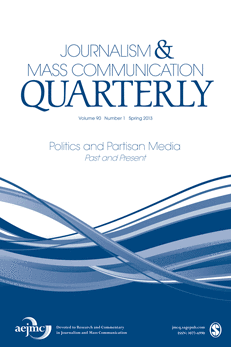
JOURNALISM & MASS COMMUNICATION QUARTERLY
Fostering dialogue on the challenges of modern media.JOURNALISM & MASS COMMUNICATION QUARTERLY, published by SAGE PUBLICATIONS INC, stands as a premier platform for scholarly discourse in the fields of journalism and mass communication. With an impressive Q1 ranking in the Communication category for 2023, this journal serves as an essential resource for researchers, professionals, and students seeking in-depth analysis and insights into contemporary media landscape challenges and evolutions. Its comprehensive scope, encompassing studies from as early as 1955 through 2024, provides a rich repository of historical and current research, ensuring a continuous dialogue about the impacts of media on society. Although not an Open Access journal, it remains highly regarded, evidenced by its Scopus rank of #41 out of 511 in the Communication field and a remarkable 92nd percentile ranking. As a critical resource, it contributes significantly to advancing academic knowledge and practical applications in journalism and mass communication.

Em Questao
Illuminating the Path of Scholarly ResearchEm Questao is an esteemed open-access journal dedicated to the fields of library science and communication studies, published by the Universidade Federal do Rio Grande do Sul, specifically through its esteemed Faculdade de Biblioteconomia e Comunicação. Since its inception in 2003, this journal has provided a platform for researchers, professionals, and students to disseminate influential scholarly work that fosters dialogue and innovation within these critical academic domains. Em Questao strives to enhance the visibility of emerging trends and methodologies in library science and communication, making it an indispensable resource for those looking to navigate the complexities of information dissemination in today's digital landscape. With a commitment to open access, it ensures that knowledge is readily available to a global audience, contributing to the advancement of these vital fields. Researchers interested in exploring insightful analyses and fostering collaborative research will find Em Questao a valuable addition to their academic resources.

DESIDOC Journal of Library & Information Technology
Advancing Knowledge in Library and Information TechnologyDESIDOC Journal of Library & Information Technology, published by the Defence Scientific Information Documentation Centre, is a pivotal scholarly platform in the realm of Library and Information Sciences. The journal, indexed with ISSN 0974-0643 and E-ISSN 0976-4658, has established its reputation with a commendable Q3 category ranking in the latest Scopus quartiles and a notable rank of 113 out of 280 in its field, placing it in the 59th percentile. Engaging a global audience, it disseminates high-quality research insights aimed at advancing the practices and technologies within library and information management. Operating within a converged timeframe from 2012 to 2024, the journal is committed to fostering robust discussions surrounding contemporary issues in the field, making it an invaluable resource for researchers, professionals, and students alike. While currently not offering open access, its content is accessible through institutional subscriptions, reinforcing its significance in the academic community of India and beyond.
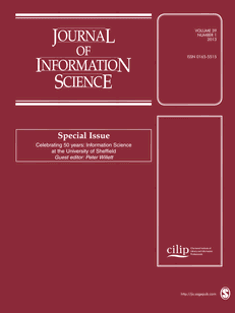
JOURNAL OF INFORMATION SCIENCE
Pioneering research in Library and Information Sciences since 1979.JOURNAL OF INFORMATION SCIENCE (ISSN: 0165-5515; E-ISSN: 1741-6485), published by SAGE PUBLICATIONS LTD, stands as a leading academic journal in the realms of Information Systems and Library and Information Sciences. Established in 1979 and continuing through 2024, this journal has become a cornerstone for researchers, professionals, and students seeking to enhance their understanding of the rapidly evolving landscape of information management. With a commendable Q1 ranking in Library and Information Sciences and a Q2 ranking in Information Systems as of 2023, it demonstrates significant influence, evidenced by its 89th percentile ranking in Scopus for Social Sciences. Although it currently does not offer open access, the journal is committed to delivering high-quality, peer-reviewed research that addresses both theoretical and practical challenges in the field. Researchers and practitioners alike will find invaluable insights that bolster their work and contribute to the broader academic dialogue surrounding information science.
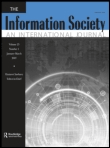
INFORMATION SOCIETY
Pioneering Interdisciplinary Insights for a Complex WorldINFORMATION SOCIETY, published by Taylor & Francis Inc, stands at the forefront of interdisciplinary inquiry, bridging the realms of cultural studies, information systems, and political science since its inception in 1981. With a commendable impact factor and recognized as a Q1 journal in multiple categories, including Cultural Studies and Management Information Systems, it serves as a pivotal platform for researchers, professionals, and students seeking insights into the ever-evolving dynamics of information in society. The journal, indexed by Scopus and ranked highly in various disciplines, not only highlights key theoretical developments but also addresses applied practices in information management within cultural and political contexts. While access is subscription-based, the journal’s impact and relevance ensure it remains essential reading for those engaged in the critical exploration of information's role in contemporary and future societies.